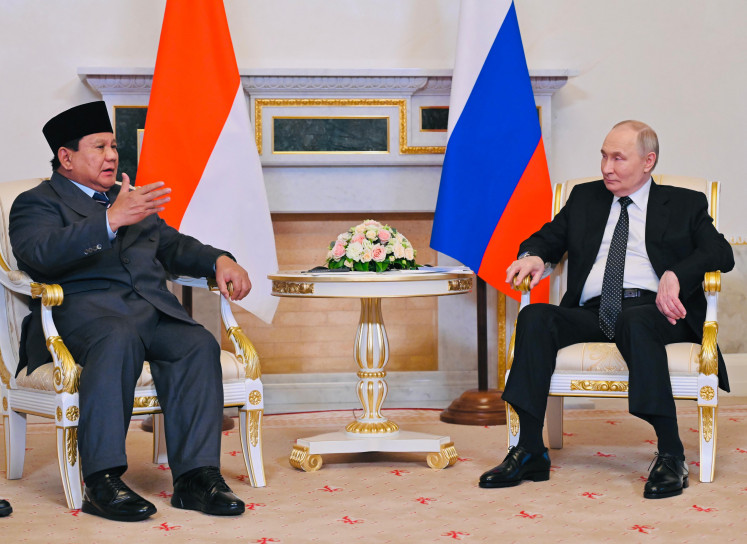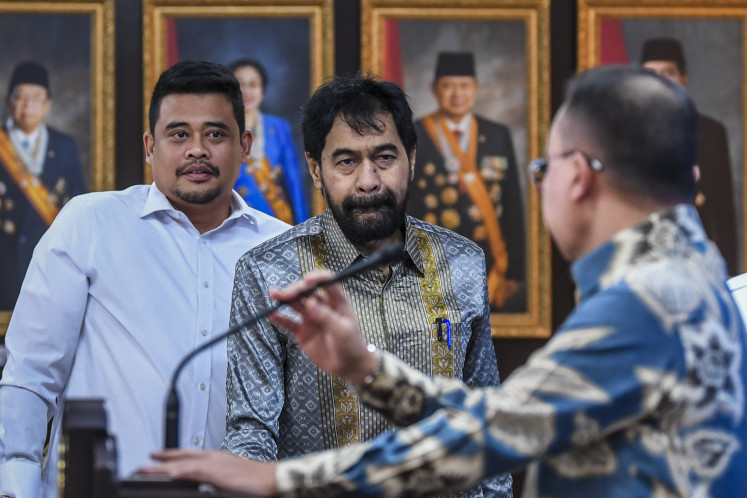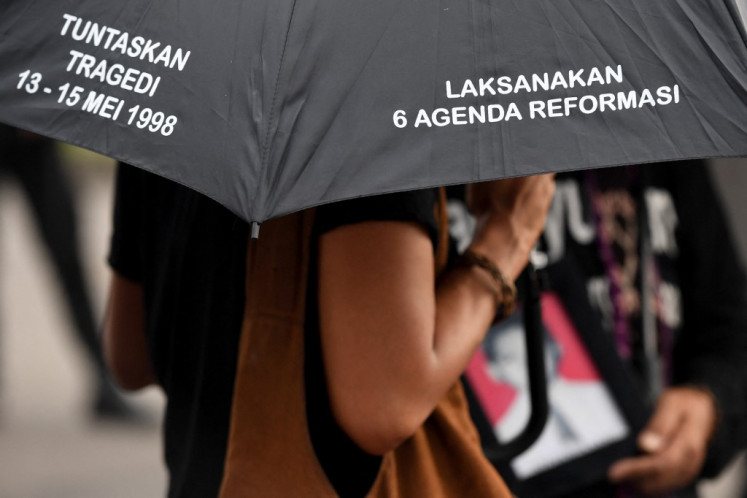Popular Reads
Top Results
Can't find what you're looking for?
View all search resultsPopular Reads
Top Results
Can't find what you're looking for?
View all search resultsGovernment and Intel ink deal to promote e-learning
The classroom full of fourth graders was busy with their Classmate PCs when teacher Hary Pujianto told them to get ready to answer five multiple-choice questions on their respective computers
Change text size
Gift Premium Articles
to Anyone

The classroom full of fourth graders was busy with their Classmate PCs when teacher Hary Pujianto told them to get ready to answer five multiple-choice questions on their respective computers.
Ignoring the children's cries, Pak Hary immediately clicked the mouse and the students had two minutes to finish the quiz on their PCs.
"After two minutes, we can immediately see their answers. The grade also comes out immediately," Hary said, pointing to his laptop.
It was a simulation by Menteng 03 state elementary school's computer laboratory. The school received Classmate PCs from Intel Corp. as part of the company's cooperation with Indonesia's Education Ministry to boost e-learning in the country. Gunung 05 elementary state school received similar assistance.
On Thursday, Intel signed agreements with Education Ministry on the Intel World Ahead program.
Intel, the world's largest computer processor manufacturer, has committed to help the government by providing affordable PCs with its latest generation of microprocessors in a move toward greater access to the Internet for students.
After the signing, chairman of the board of Intel Corp., Craig R. Barrett, met with President Susilo Bambang Yudhoyono at the Presidential Palace to discuss the US$200 personal computer program that will support the education sector in lowering the PC-to-student ratio from 1:3,000 to 1:20.
"We discussed with the President the prospect of low-cost PCs with our next generation of microprocessor that will be released in June. We'll be working with Indonesian manufacturers to produce the PCs," Barrett said after the meeting.
Presidential spokesman Dino Patti Djalal said the President appreciated the cooperation between Intel and the government and expected the low-cost PCs to be available soon for Indonesian students.
He said the President's meeting with Barrett was a follow-up to last week's meeting with Microsoft Corp. founder Bill Gates, during which they discussed free software for the low-cost computers.
"The President is very glad the government is able to move on its plan to procure computers for educational purposes at $200 per unit," Dino said.
Communication and Information Minister Muhammad Nuh said the government invited local computer manufacturers to produce the low-cost PCs.
Earlier, Education Minister Bambang Sudibyo said Indonesia hoped to provide 20-unit computer laboratories in every school in the country by 2016.
"With affordable computers like Classmate PCs it will cost a school about Rp 50 million (US$5,405) to set up a computer laboratory. In the long run, we hope each teacher and each student can have their own laptop," he said.
To support the move, the Education Ministry has been developing local content, facilitating schools and universities to develop their own content and developing e-books.
Barrett said Intel has started to donate 4,000 PCs in Indonesia over a four-year term, with 625 units given away to 33 schools this year.
"Intel has also targeted to teach 10,000 teachers in Indonesia this year through our Intel Teach program. The teacher is the one who makes magic. The computer is just a tool. How to use the tool is more important," he said.
To optimize the use of computers, Barrett named four important keys, namely accessibility, connectivity, local content and education enhancement.
"Indonesia should accelerate the number of Internet subscribers as the Internet penetration in the country is less than 10 percent with the number of those having access to broadband just 2 percent. And it is still expensive," he said.
Fourth-grade students Amanda and Venna said they could use the Classmate PCs not only to search data and browse websites.
"We can also chat with our friends and play games," they said.
Hary said the students were eager to start e-learning and "they are reluctant to leave the computer lab even after the session has finished".








